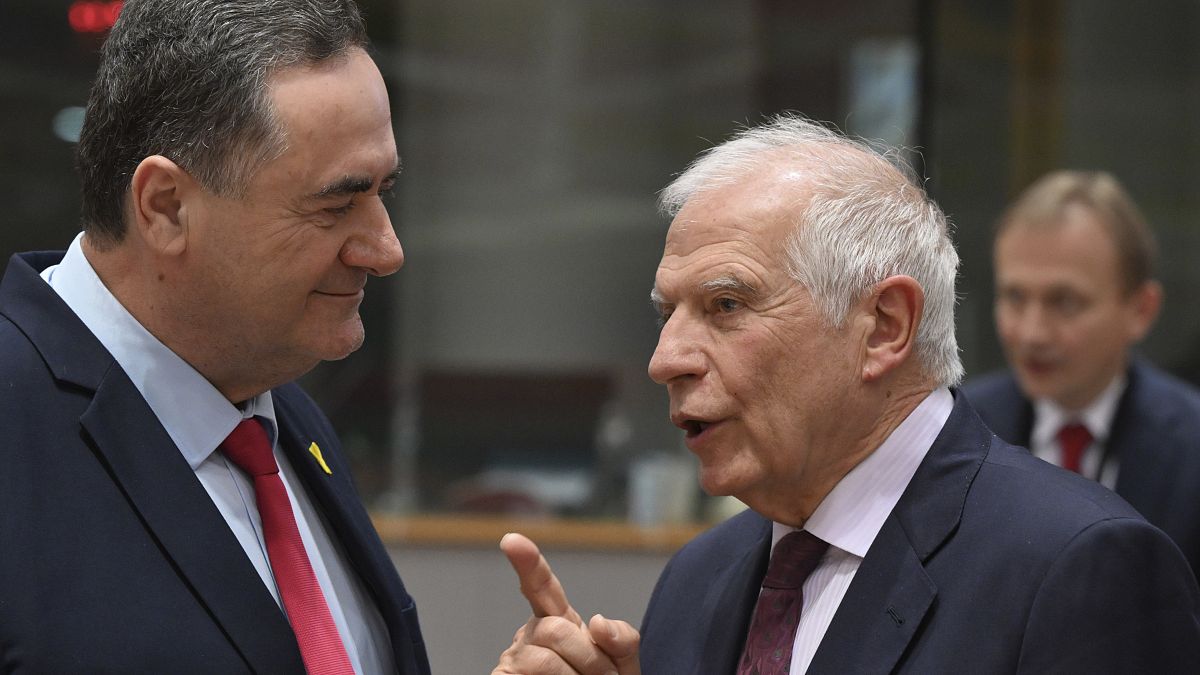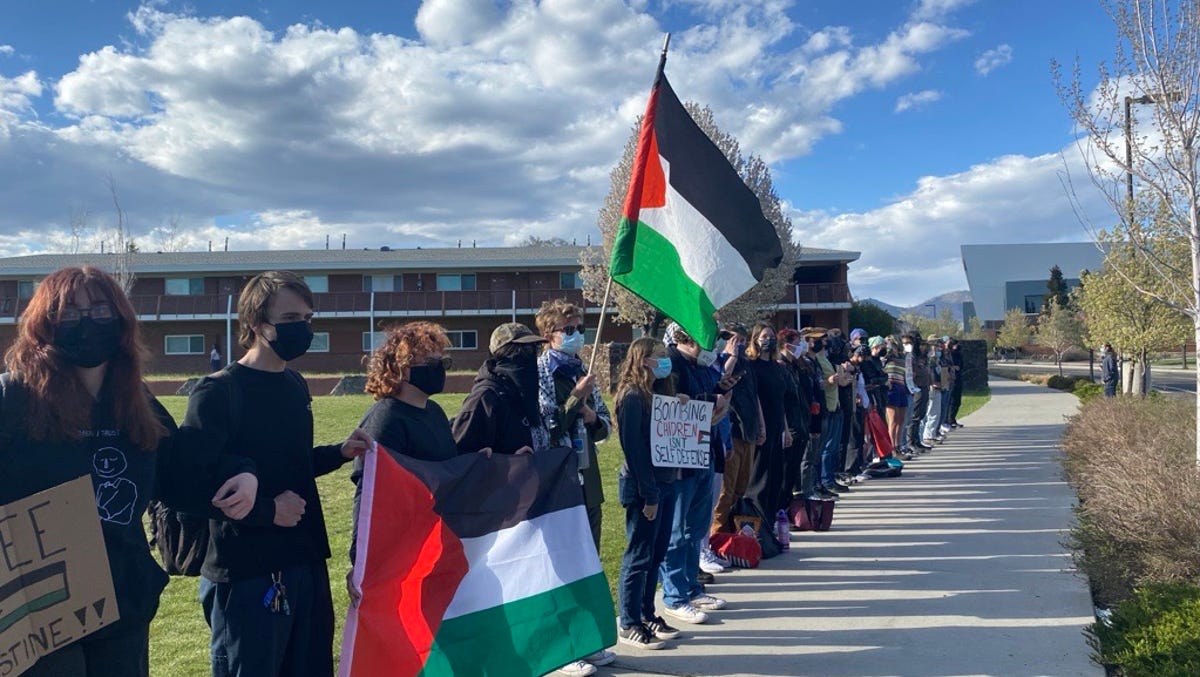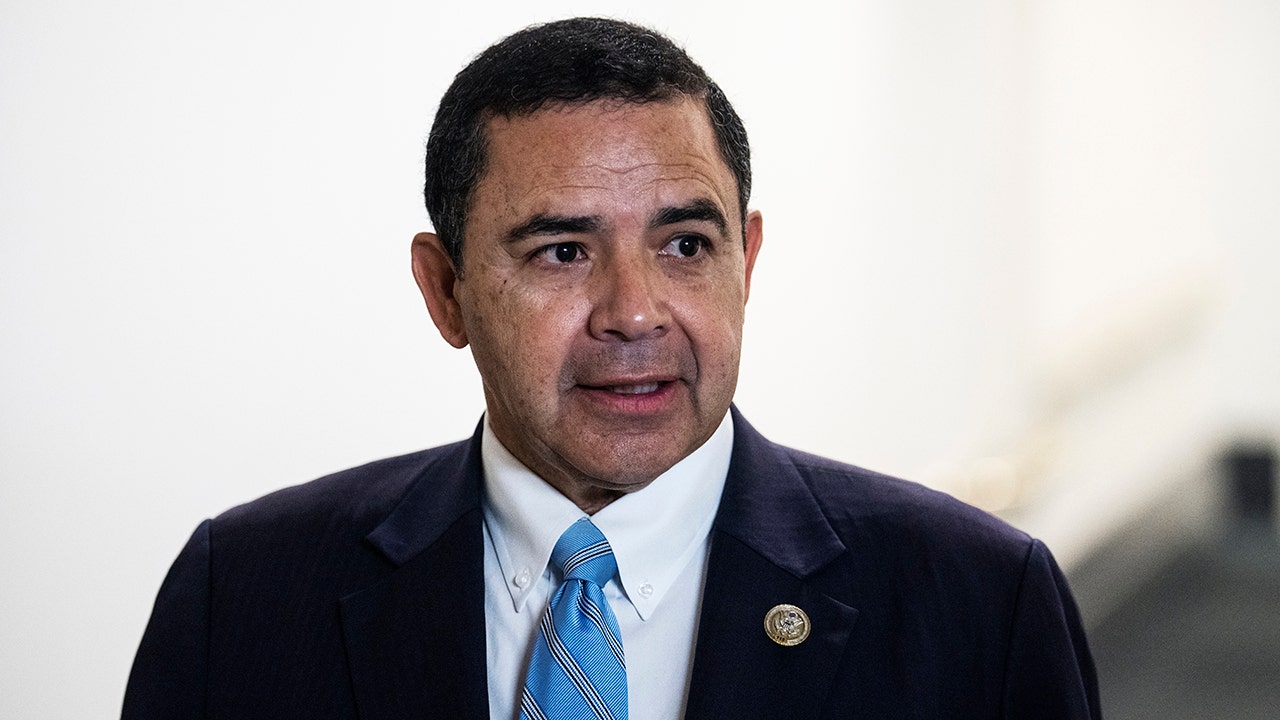World
Israeli FM's artificial island pitch is 'irrelevant', Borrell says

Israel’s foreign minister Israel Katz has sparked controversy after using a high-stakes meeting of EU foreign ministers to promote a plan to build an artificial island off the Gazan coast.
The EU ministerial meeting on Monday was intended to discuss the humanitarian crisis engulfing the Gaza Strip and the potential first steps towards a peaceful resolution to the long-term conflict between Israel and Palestine.
The bloc’s foreign affairs chief Josep Borrell, who earlier in the day had described the gathering as “exceptional”, said Katz’s intervention during the meeting – where he pitched an artificial island in the Mediterranean Sea near the Gazan coast – was “irrelevant” to the discussions.
“I think that the minister could have used his time better to worry about the situation in his country, or the high death toll in Gaza,” Borrell told reporters following the meeting.
Katz, who was recently appointed Israel’s foreign minister, showed his European counterparts two videos during the meeting, Borrell said.
The first promoted a rail infrastructure project connecting Gaza with the occupied Palestinian territory of the West Bank. The second showed a proposal to build an artificial island in the Mediterranean Sea off the Gazan coast that would serve as a commercial hub linking the Gaza Strip with the rest of the world.
The infrastructure project dates back to Katz’s time as Israel’s transport minister and was first pitched in a 2017 video as “an answer to a reality that is bad for the Palestinians and not good for Israel,” according to Reuters.
But according to a diplomatic source who spoke on condition of anonymity, Katz’s decision to pitch the initiative during discussions centred around potential future peace negotiations had left EU ministers “perplexed.”
Katz did not suggest the island could be used to house Gazans, nor did he link the initiative to the so-called two-state solution, the diplomatic source added.
But Borrell said the videos had “little, if not no relevance, to the question under discussion.”
The gathering came just a day after Israeli Prime Minister Benjamin Netanyahu repeated his opposition to the creation of a Palestinian state as part of the so-called two-state solution after the war, which has been raging since the October 7 attack on Israel orchestrated by the Hamas militant group that controls the Gaza Strip.
The two-state solution – which would deliver statehood for the Palestinians – is the overarching goal desired by EU and Western allies after the war.
Borrell doubled down Monday on his own insistence that only the two-state solution can give Israelis and Palestinians the security guarantees they need. He also said that the EU and the wider international community had a “moral obligation” to find and propose a solution.
It comes after he made controversial comments on Friday claiming Netanyahu had been “personally boycotting” the two-state solution for the past three decades.
Foreign ministers representing the EU’s 27 member states, who have at times shown disunity in their response to the war between Israel and Hamas, which is considered a terrorist organisation by the bloc, were unanimous in their support for the two-state solution, Borrell said.
“The member states have all told him (Katz), of course, that they believe that the solution for a permanent and lasting peace that guarantees Israel’s security (…) comes about with the creation of a Palestinian state,” Borrell explained.
“This surely didn’t make him change his mind, but we didn’t expect anything to the contrary,” he added.

World
Night Court Renewed for Season 3

ad
World
Colombia cuts diplomatic relations with Israel, but its military relies on Israeli technology

Colombia has become the latest Latin American country to announce that it will break diplomatic relations with Israel over its military campaign in Gaza, but the repercussions for the South American nation could be broader than for other countries because of longstanding bilateral agreements over security matters.
Colombian President Gustavo Petro on Wednesday described Israel’s actions in Gaza as “genocide,” and announced his government would end diplomatic relations with Israel effective Thursday. But he didn’t address how his decision could affect Colombia’s military, which uses Israeli-built warplanes and machine guns to fight drug cartels and rebel groups, and a free trade agreement between both countries that went into effect in 2020.
Also in the region, Bolivia and Belize have severed diplomatic relations with Israel over the Israel-Hamas war.
COLOMBIA’S PRESIDENT SAYS HUNDREDS OF THOUSANDS OF PIECES OF AMMUNITION HAVE GONE MISSING FROM MILITARY BASES
Here’s a look at Colombia’s close Israel ties and fallout:
WHY IS SECURITY COOPERATION BETWEEN COLOMBIA AND ISRAEL IMPORTANT?
Colombia and Israel have signed dozens of agreements on wide-ranging issues, including education and trade, since they established diplomatic relations in 1957. But nothing links them closer than military contracts.
Colombia’s fighter jets are all Israeli-built. The more than 20 Kfir Israeli-made fighter jets were used by its air force in numerous attacks on remote guerrilla camps that debilitated the Revolutionary Armed Forces of Colombia. The attacks helped push the rebel group into peace talks that resulted in its disarmament in 2016.
Colombian President Gustavo Petro speaks at the International Workers’ Day march in Bogota, Colombia, on May 1, 2024. Petro on Wednesday announced his government would end diplomatic relations with Israel. (AP Photo/Fernando Vergara)
But the fleet, purchased in the late 1980s, is aging and requires maintenance, which can only be carried out by an Israeli firm. Manufacturers in France, Sweden and the United States have approached Colombia’s government with replacement options, but the spending priorities of Petro’s administration are elsewhere.
Colombia’s military also uses Galil rifles, which were designed in Israel and for which Colombia acquired the rights to manufacture and sell. Israel also assists the South American country with its cybersecurity needs.
WILL PETRO’S ANNOUNCEMENT AFFECT COLOMBIA’S MILITARY-RELATED CONTRACTS WITH ISRAEL?
It remains unclear.
Colombia’s Foreign Ministry said Thursday in a statement that “all communications related to this announcement will be made through established official channels and will not be public.” The ministry didn’t immediately respond to a request for comment from The Associated Press, while the Israeli Embassy in Bogota declined to address the issue.
However, a day before Petro announced his decision, Colombian Defense Minister Iván Velásquez told lawmakers that no new contracts will be signed with Israel, though existing ones will be fulfilled, including those for maintenance for the Kfir fighters and one for missile systems.
Velásquez said the government has established a “transition” committee that would seek to “diversify” suppliers to avoid depending on Israel. He added that one of the possibilities under consideration is the development of a rifle by the Colombian military industry to replace the Galil.
Security cooperation has been at the center of tensions between the two countries. Israel said in October that it would halt security exports to Colombia after Petro refused to condemn Hamas’ Oct. 7 attack on southern Israel that triggered the war and compared Israel’s actions in Gaza to those of Nazi Germany. In February, Petro announced the suspension of arms purchases from Israel.
For retired Gen. Guillermo León, former commander of the Colombian air force, the country’s military capabilities will be affected if Petro’s administration breaks its contract obligations or even if it complies with them but refuses to sign new ones.
“At the end of the year, maintenance and spare parts run out, and from then on, the fleet would rapidly enter a condition where we would no longer have the means to sustain it,” he told the AP. “This year, three aircraft were withdrawn from service due to compliance with their useful life cycle.”
WHAT IS THE TRADE RELATIONSHIP BETWEEN THE TWO COUNTRIES?
A free trade agreement between Colombia and Israel went into effect in August 2020. Israel now buys 1% of Colombia’s total exports, which include coal, coffee and flowers.
According to Colombia’s Ministry of Commerce, exports to Israel last year totaled $499 million, which represents a drop of 53% from 2022.
Colombia’s imports from Israel include electrical equipment, plastics and fertilizers.
Neither government has explained whether the diplomatic feud will affect the trade agreement.
World
Meloni plans to rally Europe's centre-right in elections pledge

In the run-up to the European elections in June, Euronews takes a closer look at the Brothers of Italy party leader and the country’s prime minister’s speech in Pescara.
The Brothers of Italy’s conference in Pescara was more than a party gathering to launch Meloni’s electoral campaign.
The event marks a key moment in the run-up to the European elections in June, with the Italian prime minister’s address last Sunday providing crucial insight into her conservative leadership in Europe and her EU goals.
At the event, she announced that voters should use just her first name on their ballots. “Call me Giorgia,” she said.
The move is legal, and while many, including her rivals, have criticised her decision, it aligns with her image as a leader with working-class roots who took her first step into politics in Rome’s Garbatella district.
In both her role as Italy’s PM and president of the ECR group, Meloni outlined her vision for Europe.
Notably, she spoke of Brothers of Italy’s increased support over the years since the last European elections in 2019, while commenting on her ambitions to extend what her party has achieved in Italy to the rest of Europe.
“We want to do in Europe what we did in Italy … create a majority that brings together the centre-right forces and send the left into opposition,” Meloni said in Pescara in what has since been highlighted as a key statement.
Alliances based on issues, not ideals
A closer look at Meloni’s speech can help better understand what she has in mind. As ECR Co-Chairman Nicola Procaccini told Euronews, “Meloni refers to a spectrum of positions which sees both the ECR and the EPP as the two main axes when she talks about the creation of a majority that brings together centre-right forces.”
“Then, some delegations from ID in the right-wing camp,” adds Procaccini, “along with others from Renew Europe … will make up the total number that is needed to reach the majority to vote in favour of some measures.”
According to Procaccini, it is crucial to understand that the idea of “majority” within the new 720 seats-strong European Parliament is not fixed and that finding common ground with other political forces remains a possibility.
“Majorities or minorities form themselves based on the single vote. I do believe that the balance within the next European Parliament will shift to the right,” Procaccini said, adding that the EPP and a large part of Renew Europe are already voting alongside ECR, PiS or Viktor Orban’s Fidesz.
“It’s already happening today,” Procaccini continued, “not because there’s a deal in place, but based on the issues we are voting on.”
And as for sending the left into opposition, “it’s about giving the EPP the possibility to break the bond it has built with the socialists and the greens,” Brothers of Italy MP Sara Kelany told Euronews.
-

 News1 week ago
News1 week agoLarry Webb’s deathbed confession solves 2000 cold case murder of Susan and Natasha Carter, 10, whose remains were found hours after he died
-

 World1 week ago
World1 week agoHaiti Prime Minister Ariel Henry resigns, transitional council takes power
-

 News1 week ago
News1 week agoFirst cargo ship passes through new channel since Baltimore bridge collapse
-

 World1 week ago
World1 week agoUS secretly sent long-range ATACMS weapons to Ukraine
-

 World1 week ago
World1 week agoSpanish PM Pedro Sanchez suspends public duties to 'reflect'
-

 News1 week ago
News1 week agoAmerican Airlines passenger alleges discrimination over use of first-class restroom
-

 Movie Reviews1 week ago
Movie Reviews1 week agoHumane (2024) – Movie Review
-

 Education1 week ago
Education1 week agoVideo: Johnson Condemns Pro-Palestinian Protests at Columbia University



















